Ashgabat, Turkmenistan
October 2024
We have a 1 am flight from Istanbul, Turkey to Ashgabat, Turkmenistan. It’s less than a four hour flight, and as we land, the sun is rising in Turkmenistan. I watch the screen on the back of the seat in front of me as we fly over Tehran, Iran, and wonder what it’s like in Iran. Someday, I tell myself, someday I will know.
The airport landing looks like no different than any other airport landing. As our wheels touch the ground, I take a deep breath. I am in Turkmenistan! I am in the place that is supposedly the most like North Korea. My heart flutters. I’m nervous. I have no idea what to expect. I flip my phone off of airplane mode. It searches and searches. Nothing. No signal. I’m not surprised. I knew there wouldn’t be access to the outside world here. I turn it back to airplane mode to save battery.
The plane deboards and I wait quietly. My brother and Mike walk passed me; I’m excited to have them on this trip, in this new country, with me. “We’ll wait for you in the jetway,” they say as they pass by. I nod my head. I watch out the window and see that my wheelchair is being brought up the steps to the jetway. I breathe a sigh of relief, and a few minutes later, the three of us are walking towards a window with a big plane of glass. On the other side is a man who takes our passports and letters of invitation. To get into Turkmenistan, you must have a letter of invitation. Our tour company arranged this for us. We handed our documents over. “It will be $80,” he says. We pay him with the cash we knew we’d need for this and proceed to the next window. Another man looks at our passports and says, “Ok, $30,” and we pay him. He hands our passports back, each with a sheet of paper that says, “COVID PCR Test – Paid.” I assume we will get a PCR test at another stop on the way out of the airport. I quietly hope that none of us have a positive test. I can’t imagine what the quarantine process is like in a country like Turkmenistan, where I had read that they have publicly told other countries ‘they never had COVID enter their country, only a unique strain of pneumonia.’
We walk to the next stop – immigration. We had our passports to the man on the other side of the counter just as a young, gangly man wearing khakis and a polo shirt approaches us. He has a lanyard around his neck with a badge of some sort. “I’m Andrew. I’ll be your tour guide,” he tells us and he communicates in the local language to the immigration officer. He tells us to take any medicine – any kind of pill – out of our bag before putting in on the scanner, which is the next stop. “They won’t take the medicine from you, but you must disclose what you have in your bags.” We each pull out our zip lock bags, hold them up as our bags go through a scanner and us through a metal detector.
Once outside the airport, never having taken the COVID test that we paid for, Andrew shows us the car and introduces us to our driver. We drive away, towards the city of Ashgabat, and I look out the window. “Guys, look, the airport is in the shape of a falcon. It even has a beak over the front door!” It was clear already that we were in an entirely different world. The airport was grand, beautiful, stunning. And there were no more than five cars there.


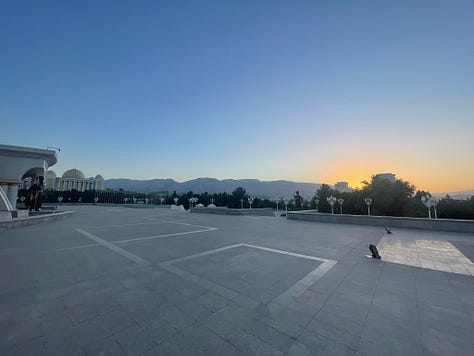
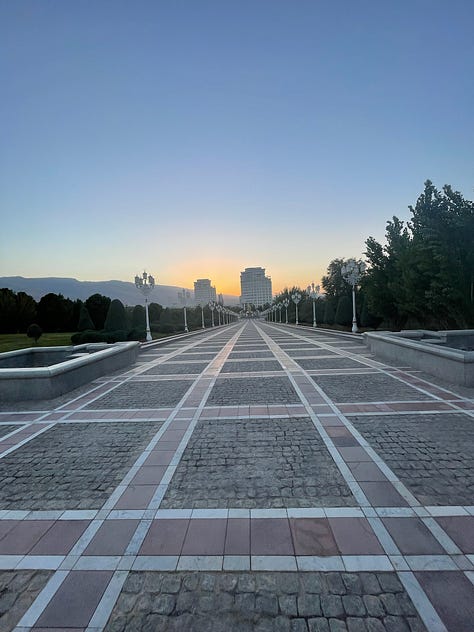
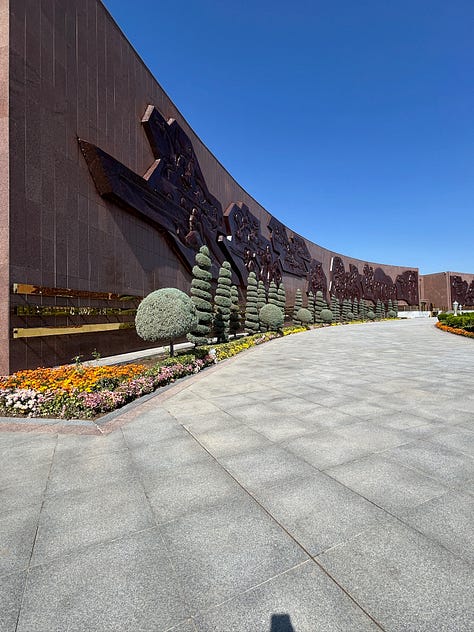

We drive for about 30 minutes to our hotel. We hadn’t slept much, nerves and excitement on the flight keeping us awake. At our hotel, we check into our rooms which smell strongly of cigarette smoke and look like they are from the 1980s. It feels like there are cameras watching us, although we can’t physically see any. But they’ll do, and besides, we’re not even sleeping in them. We’ll be driving outside of the city and staying in yurts for the night.
We charge our electronics, brush our teeth, and head to the common area for breakfast – eggs, toast, sausage, and coffee. We learn a little from our guide as we prepare for the day. Turkmenistan has a population of six million people and has immense wealth from its natural gas that it exports. The government only allows its people to have white cars, although some appear to be a very light gray. But there are no black, or blue, or red cars. The buildings in the city of Ashgabat are all white. Marble white, and it was all imported in from other countries. Everything is white. Literally everything!
There are five regions in the country, and as we learn during our city tour, the five regions are highlighted in everything. A star with five points, a symbol of Turkmenistan. Our guide explains to us that we are not be explore on our own, that all tourists must be accompanied by a guide at all times. This becomes evident during our time in their country. We never eat alone, we don’t roam the streets alone, and we are escorted through the airport, from the moment we cross immigration to the moment we cross back through immigration. Andrew is always with us. While it’s possible to drive over the border from neighboring countries, it is a mandate that a guide meet you and drive with you. Ironically, in these cases, you are allowed to enter with a car that is a different color than white.
After breakfast, we begin a tour of the city. We drive through some of the most grand streets I’ve ever seen in my life. The sky is bright blue, not a cloud in sight. And tall, white buildings appear to reach to the heavens. There are perfectly pruned bushes in either side of the street, and some of the most gorgeous parks I’ve ever seen. I’m envious of the beauty the city holds. The light posts are perfectly lined along the streets, and there’s not a single piece of litter, anywhere. It feels like we are driving on a road that leads to another world, to a heave of some sort. And…there isn’t a single person in sight.
We visit a number of monuments and statues, all perfectly created, clean, and orderly. There are vast areas of park and squares so large they seem to never end. In them, it is just us, and a few pigeons. We all wonder, “Where are all the people? Where are the people that maintain this beautiful city?” We are in awe, and at the same time, it’s so vacant of human life that it becomes creepy and uncomfortable. It’s as though everyone knew we were coming, prepared the area, and then went into hiding.
We visit the world’s largest indoor ferris wheel, which is opened only for us, because, well, there are no other people. We ride around, going up to the top, one time, looking out over the city and into the mountains far off into the distance.
At one of the parks, there is a security guard with a large pile of bouquets of flowers sitting in front of him. There are probably 50 bouquets of flowers in front of him. Andrew explains that there was a festival earlier that day and that’s why there are flowers. It’s early in the morning and I wonder what time this festival was, given that there were no people or remnants of a festival. The guard approaches me with two bouquets of flowers. He says something to Andrew, who translates for me, “These are for you. They are leftover and you can have them.” They smell amazing, and are the largest bundle of flowers I’ve ever received. I feel special.
For lunch, we eat pilav, a common rice dish. It’s delicious and reminds me of my time in Uzbekistan and Kazakhstan. At every stop, Andrew messages someone on his phone, using a messaging platform none of us have ever seen. I assume he’s reporting to his boss, letting him or her know exactly where we are and what we are doing. The schedule is rigid and we are not to miss anything.


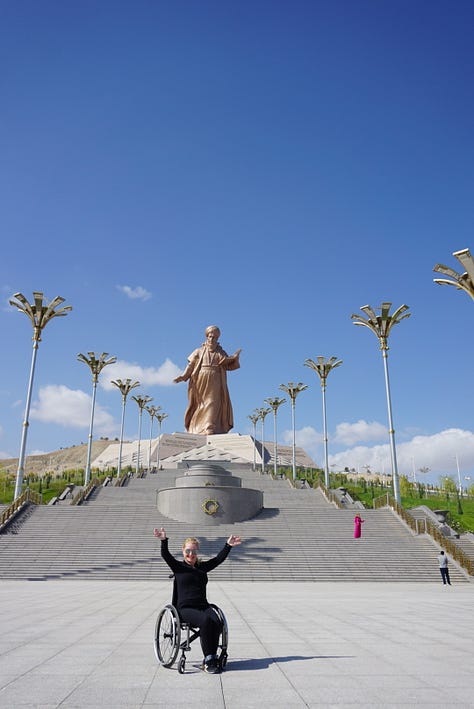

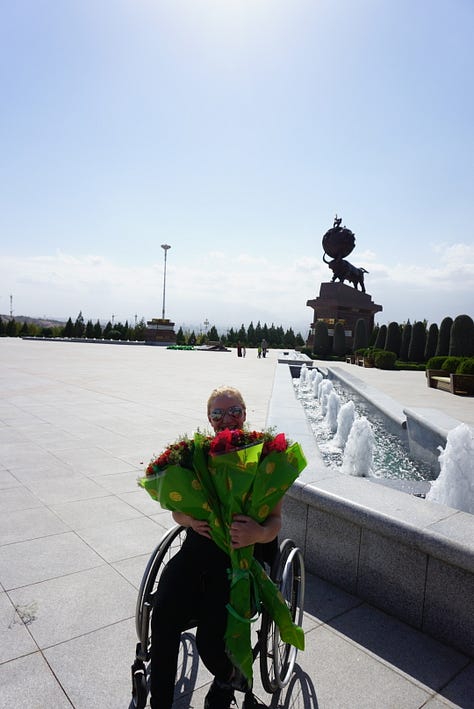

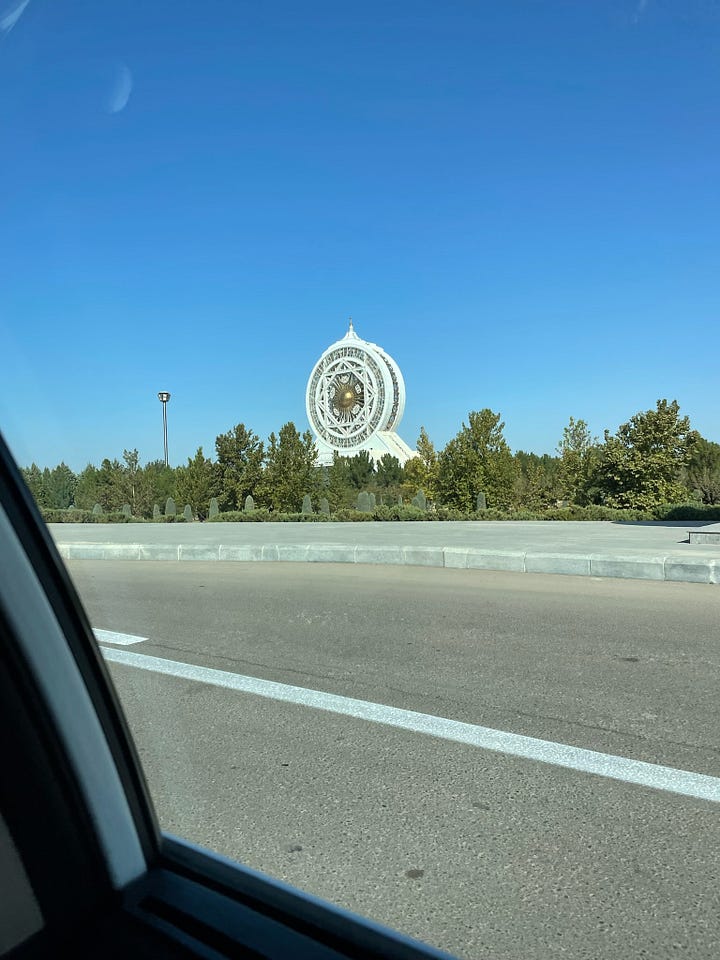
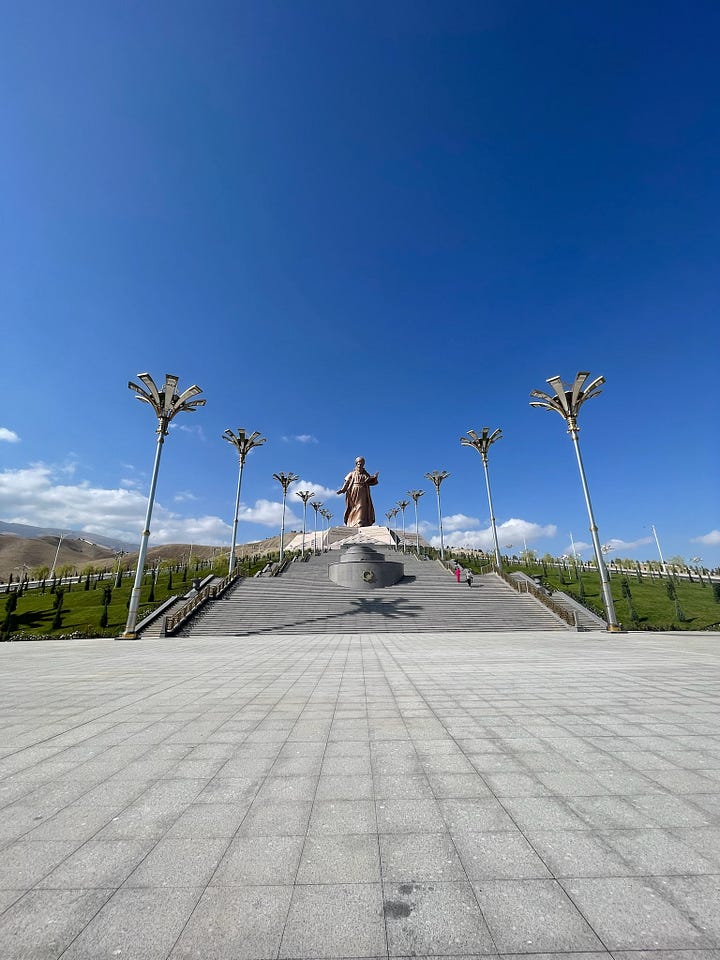
We ask questions about the war in Ukraine. “Turkmenistan is a neutral party,” is all Andrew comments. I wonder what their media is like. I wonder how much exposure to the outside world Andrew, and the people in Turkmenistan, have. I wonder if he’s allowed to have an opinion. His response feels so robotic, so calculated, so….watched.
I want to talk to him. I want to know about him. I want to drink a coffee or beer with a local. I want to know what it’s like to live in Turkmenistan. And I’m not sure I’ll ever be able to. His responses are rehearsed, and there’s no one else around.
What is it like, really like, to live in this vacant, white, majestic city? It doesn’t feel bad. It feels safe. It’s beautiful. And the few people – a hotel worker, a waiter at a restaurant, our driver, and Andrew – all appear kind. Is it possible that of all the places I’ve visited, this might be the one that is the most perplexing?
I want to talk to Matt and Mike about this, to discuss at depth the feelings I’m having. I want to ask them how they’re feeling. I want to know what they think of this place so different than any I’ve ever had. But we can’t be left alone, and so I write my thoughts in my phone, making a list of things so bizarre and foreign, to be discussed at a later time.




